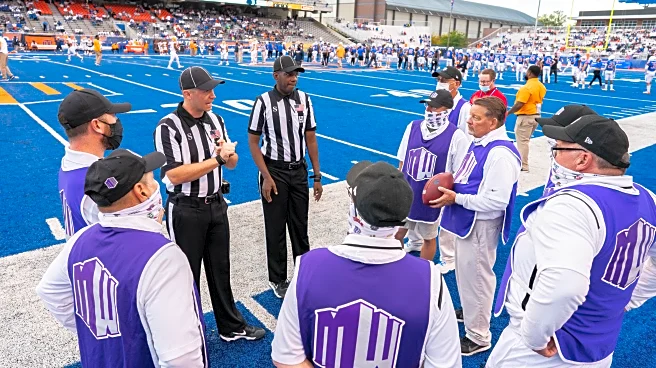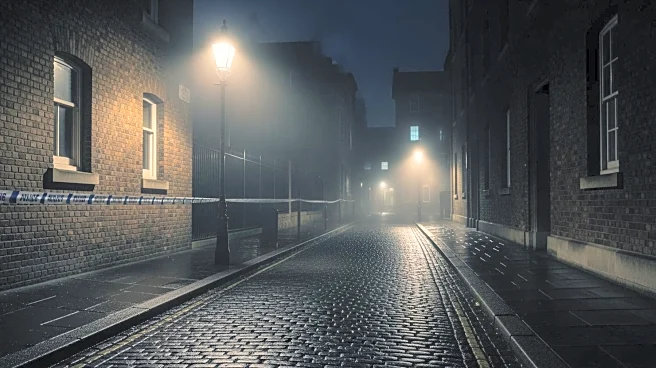Editor’s note: The referee chose to be anonymous for this interview so his privacy can be maintained as he works during the season.
MWCConnection: Please introduce yourself. What is your background in athletics? How did you get into officiating, and how long have you been doing it for?
College Referee: My name is ______, and I’ve been involved in athletics, especially football, my entire life. My great uncle was a high school football coach, and I served as a “waterboy” at a very young age. Played
youth, high school and college football. November of 1983 was the last time I played competitively. After graduating from college, I started officiating in the Fall of 1986. Took the training class, and worked on youth and club (flag) games. Two years later, I did my first high school varsity game, as a Head Linesman. Worked in high school and youth football until 1995, when I applied for a position with the Eastern Association of Intercollegiate Football Officials. I was accepted and began officiating Division 2 and 3 games. In 2005, I was promoted to Division 1 as a Field Judge and, eventually, in 2007, to Back Judge, where I have worked since.
MWCConnection: When someone becomes a football official at the college level, what is the preparation or training like? Are there opportunities for development before or after the season or trainings that everyone goes to?
College Referee: The move from high school football officiating to college requires candidates to attend 8 weeks of training-mechanics and rules, pass a rules exam, and work a college scrimmage where they are observed by experienced officials. Although football is only 13-14 weeks in the fall, the preparation begins in February with graded rules exams and study groups, working 4 or 5 Spring scrimmages, and physically staying fit to prepare for the Fall.
As a back judge, I will back pedal 17000-19000 steps during a 3-hour game. Many officials attend officiating clinics run by supervisors of all of the major conferences. These are 1, 2 or 3 day “camps” where attendees will watch hundreds of plays, and some include working a college spring game supervised by college and/or NFL officials. At the Division 1 college level, there is really only 6-8 weeks “off” after the season ends.
MWCConnection: During the season, what is a typical week like? When do you get your assignments for the weekend? Do you do anything during the week to prepare, or is it more focused on life outside of football?
College Referee: During the season, the typical week starts on Sunday, entering our fouls and explanations into our grading system. We will review crew plays of interest and communicate as a crew regarding plays of interest from our Saturday game. Time is spent Monday looking at my pre-game assignment for the following week’s game (assigned by our referee), as well as beginning to scout tendencies for our next upcoming game the next weekend. We look at special team formations, special teams, goal-line, etc., so we are prepared for the unexpected. Monday night, there is a regional college officials meeting, which includes officials who work all divisions. The goal is to improve all of our games by sharing plays from our games for discussion. Tuesday is continued preparation of the assigned pre-game topic (with film) for next Saturday’s game, and a Tuesday high school meeting (an opportunity to mentor younger officials). Thursday is a high school varsity game, as a referee (in our area, Thursday night high school is necessary because we just don’t have enough if everyone plays on Friday nights. Friday is travel day to our game site; we are required to be in our hotel by 6 pm. We have dinner as a crew, and do our pre-game meeting then. Saturday is game day (or night), where we arrive at the stadium 3 hours before kickoff and perform our assigned pre-game duties.
Outside of this main line of work, I do have a consulting business with 6 clients as well as teach a college course.
MWCConnection: On game day, what is your routine before the game? How early do you show up? What do you do during warmups, and what do conversations look like with coaches or players before the game?
College Referee: On game day, we typically arrive at the stadium three hours before kickoff. Some take the opportunity to walk the field, looking to see where we will be entering at game time, where the play clocks are, where the teams will be entering, etc. There is a 100-minute meeting that occurs 100 minutes before kickoff, and it is attended by the referee and back judge on our crew. All representatives of game administration are there, both teams are represented, replay staff, the clock operators, television, security, stadium game day operations, etc. We review contingency plans for emergencies, special events during the coin toss or during the game, etc. After this, the referee and umpire meet with both coaches in their respective locker rooms. The coach is given the officiating crew’s names, we answer any rule questions they may have, and learn about anything they may run that they may have a question about how we might rule on it. The game balls are collected from each team (usually 12-15) and they are brought to the locker room, to the back judge to test and initial (certify) for use during the game.
MWCConnection: During a game, do you have a specific approach? Obviously, every official strives to be consistent and get the calls right, but during some games, does the team decide to approach the game a certain way, like allow more contact between WRs and CBs or be more strict with holding calls, for example?
College Referee: The goal is to be as consistent as possible as a crew (and as a conference officiating staff) as possible. Hours and hours of film study are how we strive toward this goal. Coaches are trying to teach their players, so it is important that they understand “what a defensive hold is” so they can teach their players. During the Spring practices as well as during the August preseason practices, officials are brought in with the purpose of being as consistent as possible with what is being taught and how we are interpreting and enforcing the rule. I think all officials do not want to make borderline calls in any game.
MWCConnection: Can you share some insight as to what discussions are like during a huddle to discuss a call? Is it everyone sharing their perspective to figure out a call, or trying to err on the side of going to a review, or what is it like during that minute or two where you are all huddled together?
College Referee: Because from an officiating standpoint, football is a “game of angles”, and frankly, at the highest levels either 7 or 8 officials are mandatory, plus the replay staff. When there is a huddle of officials on the field, the discussion is usually a clarification of what we saw from our angle. Many times, gaining consensus on what we collectively saw will point us toward an enforcement, or in some cases, picking up a flag. On most plays, officials officiate the game independently of replay; that is, we work hard to get the play right on the field. In the case of targeting, for example, we tend to err on the side of safety by throwing the flag if we think all of the indicators are there, and then let replay confirm or call it off. We need to be very good at the replay rules in order to be good communicators with the coaches regarding what is reviewable and what is not.
MWCConnection: During the times where perhaps a call is scrutinized by players, coaches, or fans, or a time where you know you probably got a call wrong, how do you move past that or keep it from being on your mind for the next play?
College Referee: This is probably one of the biggest growth areas for any official. Part of that mindset is understanding that in a game with 180 plays, for example, there will be 170+ that are routine, pre-snap, key, clock, clean up after, and there will be 2 or 3 plays where we will need to earn our pay as a crew. They don’t tell us when they will happen, but I think this approach helps me recognize when we have to slow down as a crew and work through what just happened. Fortunately, compared to other sports, we have a few seconds to “digest” what just happened and the ability to communicate with our adjacent officials to get the play right. If we have doubt afterward, sticking to our pre-snap routines helps us move on to the next play.
MWCConnection: After a game, do you review the game film right away, or does that come after you’ve had some time away to be in a more objective headspace?
College Referee: We are given access to the film almost immediately after the game, and the entire crew knows exactly which plays we want to look at at the airport or on our way home. Oftentimes, these plays are unnoticed by the coaches or fans, but we may have a question in our mind whether what we thought we saw was what we really saw. I have never done a game in 39 years where I left thinking “that was perfect”. There are always things we think we missed, or called and shouldn’t have called, etc. Our graders get the film on Sunday, and we will have our grades by Tuesday. We are graded on calls, non-calls, mechanics, etc. Often, the grading will involve our handful of questionable calls, but may also include situations we felt 100% confident about. During the week, we will communicate as a crew regarding these questions in the interest of continuous improvement.
MWCConnection: What does life look like for you after the season? Do you take a lot of time away from the game, or is there time devoted to training and improving, like there would be for players?
College Referee: My goal is to have January and February without football, other than watching games on TV. Our season starts in February when we begin rules meetings and film reviews. It also goes without saying that physical conditioning never stops. Officiating football is a mentally and physically demanding sport, and it isn’t practical to “get in shape” as the season approaches. Our coaches and players expect officials who are in shape and in position-they prepare very hard, and the expectation is that we do as well.
MWCConnection: What are your favorite and least favorite aspects of your job?
College Referee: My favorite parts without question are the relationships that develop over the years with our crewmates, assignors, and prospects, as well as the time from kickoff to the end of the game. My least favorite aspects are the travel and logistics, which become less fun as the season turns into November and December-hotels, flights, traffic, time away from family, etc.
MWCConnection: What is something fans would not know about your job that you would like them to know about?
College Referee: I think fans would be very surprised to learn just how many hours college football officials spend outside the 3 1/2 hours on game day. The “season” starts in February, getting back into the rule book with regular tests and study meetings. As spring approaches, scrimmages give us an opportunity to improve different aspects of our game, during the summer we have our conference clinics followed by preseason scrimmages. Almost all year long for 12-14 31/2 hour games.
MWCConnection: What is a piece of advice that you would share with someone who is thinking about becoming a football official?
College Referee: The one piece of advice is to understand that the first 2 or 3 seasons can be difficult. Learning the rules and mechanics while also learning how not to take criticism personally can be a challenge. Much of what we do comes from a place of confidence and presence (looking the part). The more prepared we are, and the more comfortable and confident we become, the better the games come. Most new officials learn by working lower-level games, where often parents and coaches are out of control. I often say that if you can work a season of youth football with 2 other officials on the field and get through most games without a riot, you can work anything. Usually, if people stay in football officiating for 3 years, they usually stay for decades.
















